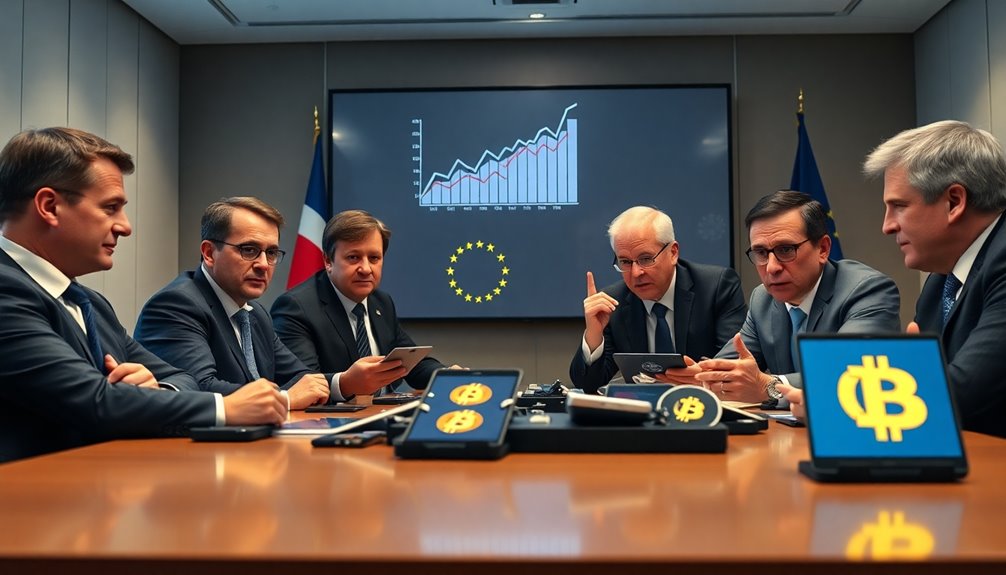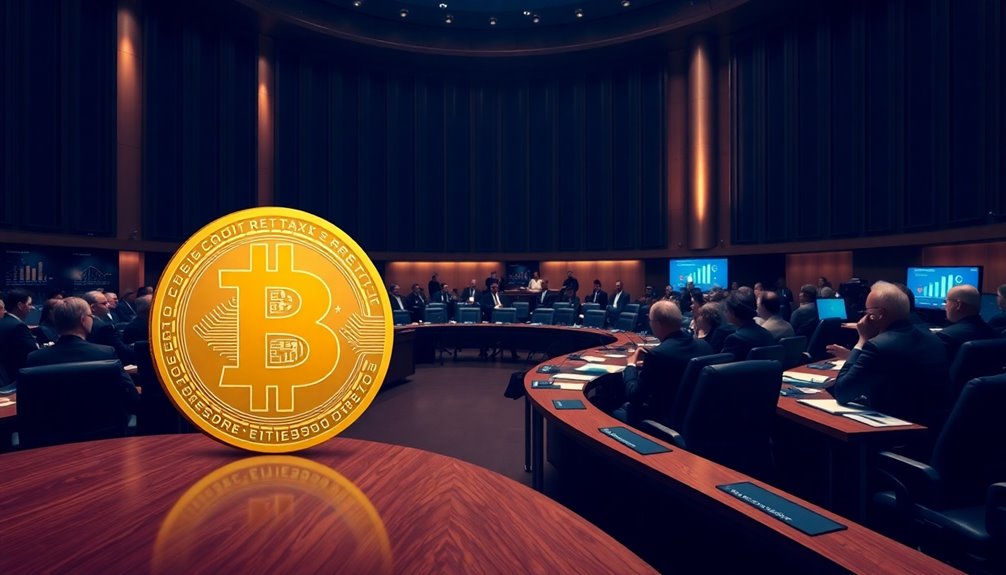French politicians are pushing for Bitcoin to become an EU reserve asset, aiming for greater financial autonomy and stability. They're aware that Bitcoin can combat inflation and protect against poor economic decisions. With annual returns estimated between 50% and 60%, it's seen as a smart move to diversify financial reserves. Moreover, U.S. efforts to establish Bitcoin reserves highlight its rising importance. However, while this shift sounds promising, challenges like regulatory hurdles and environmental concerns remain. If you explore further, you'll uncover the nuances behind this significant political move and what it means for the future of cryptocurrency in Europe.
Key Takeaways
- French politicians see Bitcoin as a strategic reserve asset to enhance financial autonomy and mitigate economic instability within the EU.
- The potential for high annualized returns from Bitcoin could offer diversification and bolster national security for EU member states.
- Support for Bitcoin among political figures is growing, indicating a shift towards embracing digital assets in Europe's financial systems.
- Concerns over the centralized nature of the digital euro have prompted interest in decentralized alternatives like Bitcoin among French lawmakers.
- The evolving regulatory landscape in the EU may create opportunities for Bitcoin adoption as a reserve asset, reshaping global finance.
The Proposal for a Bitcoin Reserve

The proposal for a strategic Bitcoin reserve in the EU aims to enhance financial autonomy and protect citizens from the impacts of poor economic decisions made by national governments. By adopting Bitcoin, you could combat inflationary pressures while gaining a hedge against centralized control.
Look at global examples like El Salvador, where early Bitcoin investment has yielded significant capital gains, boosting national security and sovereignty. The potential annualized returns of Bitcoin sit between 50% and 60%, despite the occasional bear market. This presents an opportunity for the EU to diversify its financial strategies and avoid disadvantages in the global monetary landscape.
Embracing Bitcoin also opens doors for economic freedom and wealth creation through crypto assets. With France's nuclear energy infrastructure, the EU could leverage a competitive advantage in Bitcoin mining. Establishing a robust mining sector could lead to significant economic benefits, especially as the EU seeks to grow its Bitcoin mining industry.
However, it's crucial to address the current regulatory and tax policies that stifle innovation. A supportive regulatory framework can encourage crypto asset growth, protecting personal wealth and promoting financial freedom. Advocating for these adjustments could be key to adapting to the rapidly evolving monetary landscape.
Critique of the Digital Euro

As discussions about the digital euro gain momentum, several concerns emerge regarding its implementation and potential impact on the financial landscape.
First, the costs for European banks to update their infrastructure could reach billions, affecting every customer touchpoint, from branches to mobile apps. Though existing SEPA instant payment rails can help, banks must still assess the financial ramifications, especially with updates due by the end of the decade. Additionally, the emphasis on privacy in the digital euro aims to protect user data, raising questions about how banks will adapt to these new privacy standards.
Next, the digital euro might shift deposits away from traditional banks, jeopardizing credit supply and financial stability. In turbulent times, significant withdrawals could threaten the entire system. While holding limits and a "waterfall mechanism" aim to address these risks, the absence of interest payments on digital euro accounts may deter large holdings.
On a technical level, the centralized nature of the digital euro presents a single point of vulnerability to cyber threats. Ensuring interoperability with existing systems and safeguarding infrastructure against global risks are critical challenges.
Lastly, it's essential to consider those with limited digital access, as they could be excluded from this new payment system, raising concerns about inclusivity in the digital economy.
Current Regulatory Landscape in France

With ongoing debates about the digital euro, understanding the current regulatory landscape in France becomes increasingly important for anyone involved in cryptocurrencies.
Since 2019, France has implemented a licensing regime for crypto-asset service providers (CASPs), requiring them to register under the Monetary and Financial Code. This registration mandates compliance with anti-money laundering (AML) and anti-terrorist financing regulations, overseen by the Autorité des Marchés Financiers (AMF). Compliance with the Monetary and Financial Code is emphasized as non-negotiable for all operators.
French regulators have actively targeted unregistered crypto-asset ATMs, conducting search and seizure operations as recently as June and December 2024. Violating these regulations can lead to severe penalties, including up to two years in prison and fines reaching 30,000 euros.
The AMF collaborates closely with the Paris inter-regional jurisdiction (JIRS) to enforce compliance rigorously.
As the European Union's Markets in Crypto-Assets (MiCA) regulation prepares to launch on December 30, 2024, CASPs must transition to this new framework, which will introduce stricter controls.
Additionally, crypto gains are taxed up to 30% for occasional traders, with severe penalties for any tax evasion. Understanding these regulations is crucial for navigating the evolving landscape of cryptocurrencies in France.
Economic Context and Consequences

Adopting Bitcoin as a reserve currency could significantly impact France's economic landscape. The volatility of Bitcoin might destabilize macroeconomic stability, making it challenging for central banks to control monetary policy.
You'd see domestic prices fluctuate dramatically, especially for imported goods, leading to uncertainty for consumers and businesses alike. Managing multiple currencies could strain households and firms, requiring substantial resources to navigate this complexity. Furthermore, integrating Bitcoin into the financial system could enhance tax-efficient growth in retirement savings for some investors. Additionally, the use of specialized hardware for mining may increase energy costs, further complicating economic dynamics. Moreover, investments in precious metals like gold could provide a more stable alternative during periods of Bitcoin volatility.
Moreover, the risks to financial integrity are concerning. The lack of robust anti-money laundering measures could facilitate money laundering and tax evasion, threatening the financial system's stability. As the U.S. considers a strategic reserve of Bitcoin, it may prompt similar discussions in Europe regarding currency management.
If taxes are quoted in Bitcoin while expenditures remain in euros, government revenues would be exposed to exchange rate risk.
Consumer protection also becomes a significant issue. While Bitcoin's decentralized nature offers some financial privacy, its volatility leaves you vulnerable to substantial losses without traditional safeguards. Additionally, the potential for significant returns due to Bitcoin's volatility could attract more investors, compounding the risks involved.
Additionally, the environmental impact of Bitcoin mining raises questions about its long-term viability. Overall, while some believe a strategic Bitcoin reserve could enhance national security, the potential economic consequences suggest caution is warranted.
Global Political Support for Bitcoin

Support for Bitcoin is gaining momentum among global political figures, reflecting a shift in attitudes towards digital assets. Notably, Donald Trump has embraced the crypto movement, dubbing himself the "crypto president" and pledging to establish a Bitcoin and crypto advisory council if re-elected. His family's launch of the DeFi project, "World Liberty Financial," underscores their commitment to this emerging sector.
Kamala Harris is also evolving her stance, recognizing the importance of digital assets within her broader support for innovation. She's focused on fostering technological advancements while advocating for strong consumer protections. The potential establishment of a Bitcoin strategic reserve by the U.S. government demonstrates the increasing recognition of digital assets' importance in national economic strategies.
The U.S. plays a pivotal role in shaping global digital asset regulations, which influences investor sentiment worldwide. The recent approval of a crypto spot ETF by the SEC has further legitimized Bitcoin. Upcoming congressional elections will be critical in determining U.S. crypto policies, potentially including significant legislation like the FIT21 bill.
As countries explore the potential of Bitcoin as a reserve asset, the political backing it receives could lead to transformative changes in the global financial landscape, reinforcing Bitcoin’s position as a serious contender in national economic strategies. One of the potential game-changers for Bitcoin’s acceptance as a reserve asset is the expressed interest from an asian legislative leader in incorporating it into their country’s financial reserves. This kind of endorsement could significantly impact the perception of Bitcoin’s stability and potential as a long-term store of value. If more countries follow suit and adopt Bitcoin as part of their reserve strategy, it could fundamentally shift the dynamics of global finance, opening up new opportunities and challenges for the traditional financial system.
Advocacy for Mining and Tax Reform

As the cryptocurrency landscape evolves, advocacy for mining and tax reform has become increasingly vital.
With the environmental impact of energy-intensive mining processes under scrutiny, EU leaders are pushing for reforms to reduce reliance on these methods. High electricity demand not only drives up prices but also contributes significantly to CO2 emissions. The EU's recent decision to propose a tax increase on bitcoin reflects the growing need for regulatory frameworks that can adapt to the changing market landscape.
The EU is exploring regulatory proposals, including a tax on each mined coin to address both environmental and economic concerns. Unique identifiers for mined coins will help track compliance, ensuring only legally taxed coins circulate within the EU.
The MiCA regulation aims to harmonize crypto-assets across the region while preventing money laundering and terrorism financing.
Different EU countries are implementing their own tax strategies, like Italy's proposed increase in capital gains tax on bitcoin to fund public initiatives. France and Austria have established varied tax rates on crypto, reflecting the need for a cohesive approach as adoption grows.
As you navigate these changes, it's crucial to stay informed about evolving regulations and how they might impact your investments and activities in the crypto space.
Frequently Asked Questions
How Would Bitcoin Affect Everyday Transactions for EU Citizens?
Bitcoin could significantly change your everyday transactions in the EU.
You'd find it easier to make quick, borderless payments without traditional banks' fees. With the rise of stablecoins, your transactions might become more stable, reducing volatility concerns.
Plus, as regulations increase transparency, you'd feel more secure knowing your transactions are traceable, helping prevent fraud.
What Are the Risks of a Bitcoin Reserve for the EU?
If the EU considers a Bitcoin reserve, you should be aware of several risks.
Market volatility could lead to significant financial losses, jeopardizing economic stability.
Regulatory challenges may arise, as existing legal frameworks mightn't adequately support such a move.
Security concerns also loom, with potential cyber threats and privacy issues affecting citizens.
Additionally, operational difficulties could hinder effective management of the reserve, making it crucial to weigh these risks carefully before proceeding.
How Can Citizens Engage With This Proposal?
You can engage with the proposal by participating in public hearings organized by the European Parliament or national bodies.
Share your thoughts through consultations or by submitting written comments.
Reach out directly to your Members of Parliament to voice your support or concerns.
Consider signing petitions or joining advocacy groups focused on cryptocurrency.
Staying informed through reliable news sources and attending educational seminars will also help you understand the implications and engage effectively.
What Are Potential Benefits for Small Businesses?
As a small business owner, you can benefit significantly from adopting Bitcoin.
It offers inflation protection with a fixed supply, ensuring your reserves maintain purchasing power.
Lower transaction costs mean you save money compared to credit cards, and finality in transactions reduces fraud issues.
Plus, Bitcoin's decentralized nature enhances your financial independence, allowing you to accept international payments more easily while mitigating currency risks that affect your operations.
Embracing Bitcoin can empower your business.
How Does Bitcoin Mining Impact the Environment?
Bitcoin mining significantly impacts the environment by consuming vast amounts of energy, comparable to a small country.
Much of this energy comes from fossil fuels, leading to high carbon emissions and contributing to climate change.
You mightn't realize it, but mining also generates substantial electronic waste due to the short lifespan of mining hardware.
While some efforts aim to use renewable energy, the overall environmental footprint remains a pressing concern.
Conclusion
In conclusion, the push by French politicians for Bitcoin as a potential EU reserve reflects a growing recognition of its value. As concerns about the Digital Euro rise, this proposal could reshape the financial landscape. With global political backing and calls for mining and tax reforms, you might want to keep an eye on these developments. Embracing Bitcoin could not only enhance economic resilience but also position Europe at the forefront of the cryptocurrency revolution.










